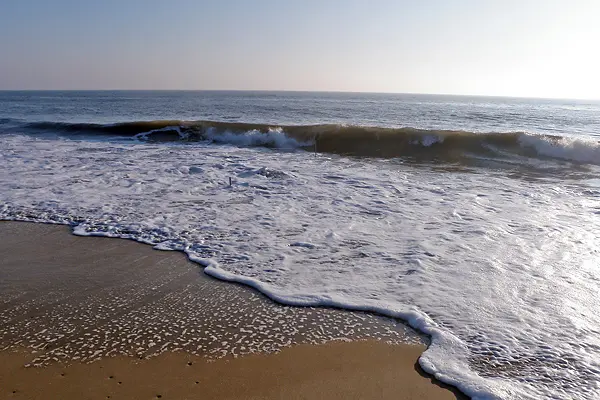UMass Lowell, Woods Hole Effort Funded by National Science Foundation

10/20/2020
Contacts for media: Nancy Cicco, 978-934-4944, Nancy_Cicco@uml.edu or Christine Gillette, 978-758-4664, Christine_Gillette@uml.edu
LOWELL, Mass. – UMass Lowell researchers are working to determine how severe coastal storms contribute to water pollution in an effort funded by a $784,000 grant from the National Science Foundation.
Led by UMass Lowell’s James Heiss, assistant professor in the Department of Environmental, Earth and Atmospheric Sciences, the team will use computerized sensors installed at sites along the shoreline to measure groundwater flow to track how such storms may affect the amount of saltwater in beach aquifers. The team is collaborating with UMass Lowell Computer Science Prof. Fred Martin to develop the sensor network.
Important to maintaining a balanced ecosystem, beach aquifers are underground layers of rocks, sand and gravel that conduct saltwater and freshwater, and are important in filtering groundwater contaminants before they can discharge to the ocean.
While scientists understand how tides and seasonal changes in rainfall influence groundwater flow, far less is known about the effects of coastal storms, which bring pounding waves, heavy rains and beach erosion.
“The response of beach aquifers to those interacting factors is not clear. This is what our research aims to find out,” said Heiss, a Lowell resident. “Large-scale intrusion of saltwater is a major problem in many coastal communities and large cities that rely on groundwater as a source of drinking water. In beach aquifers, the increasing salinity will also likely influence the aquifers’ ability to remove pollutants before flowing into the ocean.”
As sea level rises and coastal storms become more frequent and intense due to climate change, more seawater gets introduced into coastal aquifers, which may affect those ecosystem services, according to Heiss.
Researchers from the Woods Hole Oceanographic Institution are working with UMass Lowell on the study. The team will analyze the effects of coastal storms on groundwater flow and the mixing patterns between seawater and fresh groundwater in beach aquifers.
Nitrate, along with phosphorus, mercury and other harmful chemical contaminants from human activities, are transported in groundwater to the sea, so it is important to understand the physical movement of that groundwater in these environments, according to Heiss.
“Excess nitrogen in coastal waters can cause algal blooms, mass die-offs of fish and loss of biodiversity, which can impact the environment and coastal economies. Red tides, blue-green algae and cyanobacteria release toxins that can be harmful to humans, pets, fish, shellfish, marine mammals and birds,” Heiss said.
The experiments will be conducted at the U.S. Army Corps of Engineers Field Research Facility in Duck, N.C., which has specialized equipment and dedicated beach access that features a long research pier that extends from the dune line into the Atlantic, according to Heiss.
The researchers will install their network of sensors in monitoring wells on the beach next summer ahead of hurricane season. The wells and sensors will stay in place for a few months to record groundwater parameters at various depths as storms pass over the study site. The sensors will send the readings to an electronic data recorder positioned on the beach, which will transmit the information to a base station behind the dune line.
UMass Lowell students contributing to the project include computer science majors Zachary McCann or Arlington, Sam Patriquin of Chelmsford, Charlie Mirabile and Joel Savitz of Newton, John Swanson of Westford and mechanical engineering major Eric Viscione, also of Westford. Environmental science major Kristopher Leary of Andover, who graduated in May, also participated.
UMass Lowell is a national research university offering its more than 18,000 students bachelor’s, master’s and doctoral degrees in business, education, engineering, fine arts, health, humanities, sciences and social sciences. UMass Lowell delivers high-quality educational programs and personal attention from leading faculty and staff, all of which prepare graduates to be leaders in their communities and around the globe. www.uml.edu
